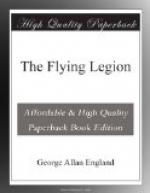No further attack was made on Nissr, nor was anything seen of any other air-squadron of International Police. The wireless picked up, however, a cross-fire of dazed, uncomprehending messages being hurled east and west, north and south—messages of consternation, doubt, anger.
The world, wholly at a loss to understand the thing that had come upon it, was listening to reports from the straggling Azores fleet as it staggered into various ports. Every continent already was buzzing with alarm and rage. In less than eighteen hours the calm and peaceful ways of civilization had received an epoch-making jar. All civilization was by the ears—it had become a hornet’s nest prodded by a pole no one could understand or parry.
And the Master, sitting at his desk with reports and messages piling up before him, with all controls at his finger-tips, smiled very grimly to himself.
“If they show such hysteria at just the initial stages of the game,” he murmured, “what will they show when—”
The Legion had already begun to fall into well-disciplined routine, each man at his post, each doing duty to the full, whether that duty lay in pilot-house or cooks’ galley, in engine-room or pit, in sick-bay or chartroom. The gloom caused by the death and burial at sea of Travers, the New Zealander, soon passed. This was a company of fighting men, inured to death in every form. And death they had reckoned as part of the payment to be made for their adventuring. This, too, helped knit the fine mass-spirit already binding them together into a coherent, battling group.
A little after two in the afternoon, Nissr passed within far sight of the Azores, visible in cloud-rifts as little black spots sown on the waters like sparse seeds on a burnished plate of metal. This habitation of man soon slipped away to westward, and once more nothing remained but the clear, cold severity of space, with now and then a racing drift of rain below, and tumbling, stormy weather all along the sea horizons.
The Master and Bohannan spent some time together after the Azores had been dropped astern and off the starboard quarter. “Captain Alden” remained in her cabin. She reported by phone, however, that the wound was really only superficial, through the fleshy upper part of the left arm. If this should heal by first intention, as it ought, no complications were to be expected.
Day drew on toward the shank of the afternoon. The sun, rayless, round, blue-white, lagged away toward the west, seeming to sway in high heaven as Nissr took her long dips with the grace and swiftness of a flying falcon. Some time later the cloud-masses thinned and broke away, leaving the world of waters spread below in terrible immensity.
As the African coast drew near, its arid influences banished vapor. Now, clear to the up-curving edge of the world, nothing could be seen below save the steel-gray, shining plains of water. Waves seemed not to exist. All looked smooth and polished as a mirror of bright metal.




